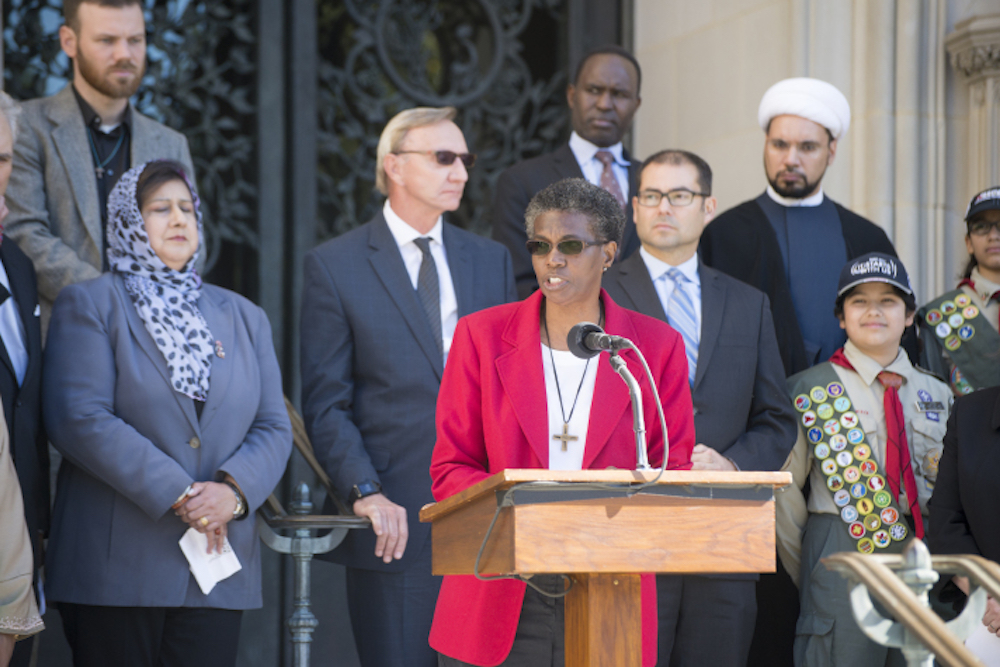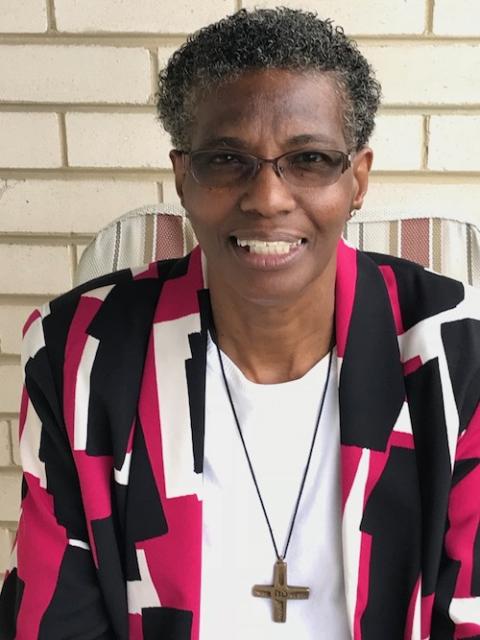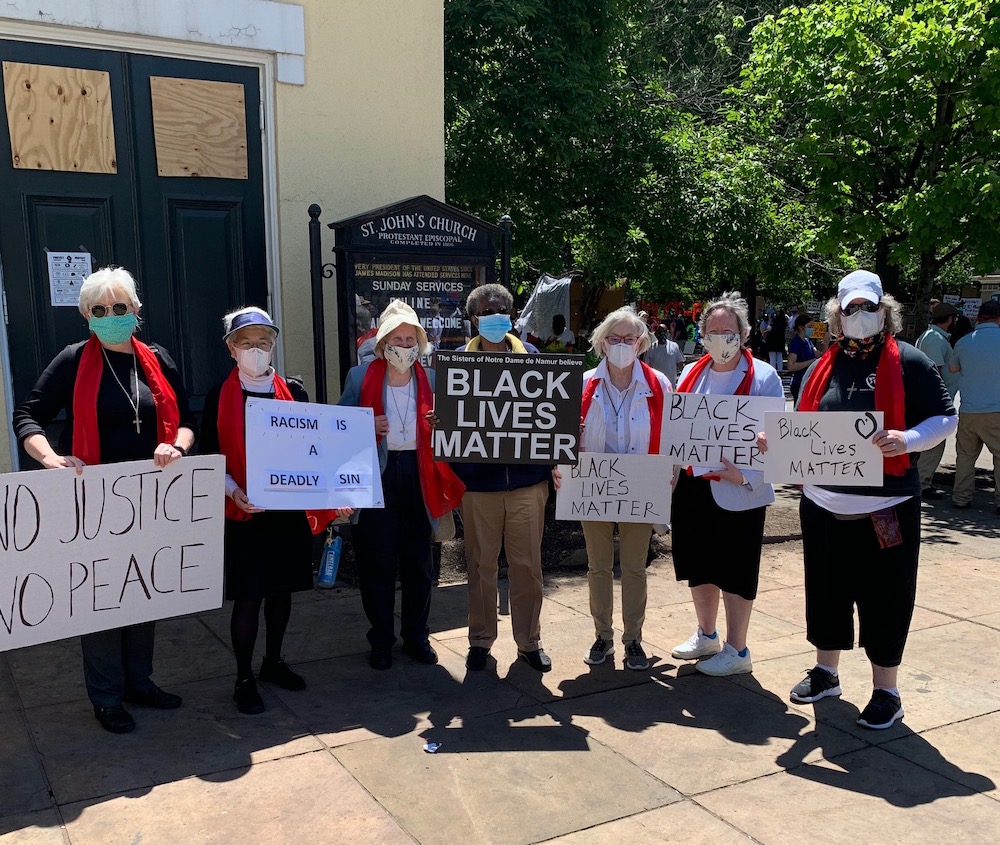
Following the December 2012 Sandy Hook school shooting, in which 20 children were killed in Newtown, Connecticut, Notre Dame de Namur Sr. Patricia Chappell was asked to speak on behalf of the Catholic community at the National Cathedral in Washington, D.C. She is at the podium. (Provided photo)
Editor's note: After a two-year delay, Sr. Patricia Chappell finally received her Outstanding Leadership Award in person Aug. 12 at the 2022 assembly of the Leadership Conference of Women Religious. GSR is republishing this profile in honor of the occasion. Read her remarks at the 2022 assembly here.
Decades in nonviolence and anti-racism work has prepared Sr. Patricia Chappell for this tense moment in United States history, as her lifelong passions have become part of mainstream conversation in the country.
Chappell, a Sister of Notre Dame de Namur, was the executive director of Pax Christi USA for eight years and president of the National Black Sisters' Conference for five years. Now the co-coordinator of her community's anti-racism team, she has long been involved in anti-racism work, helping religious communities confront the systemic racism within their congregations.
And right now, she's especially hopeful that communities of women religious can move toward "being in right relationship with those who think and look differently than the majority of us," she said.
As she's attempted to right the injustices she saw around her, Chappell said she never thought the Leadership Conference of Women Religious noticed her ministries until they called to tell her she would be the recipient of this year's Outstanding Leadership Award, though the award ceremony has been postponed until next year because this year's assembly will be virtual.
Though the honor came as a surprise to Chappell, her friends who spoke with Global Sisters Report said her tenacity, open-mindedness and dogged pursuit of justice make her a natural and effective leader.
Victoria Virgo-Christie*, an old family friend of Chappell's, said the fact that she's been "a consistent advocate for the underserved is what allows her to stand out."
"She's not willing to just stay comfortable," she said.
By diving into those awkward conversations, Chappell, 67, "brings other members of the religious congregation into situations that they wouldn't necessarily" choose to be in.
Chappell's spirituality, as Notre Dame de Namur Sr. Anne-Louise Nadeau said, is grounded in a God of liberation: "She wants all people to have the fullness of life as Jesus promised."
Indeed, Chappell said she takes issue with how Catholic theology often responds to sorrow and adversity in this life by pointing to the salvation that awaits.
"You can't tell me that I should be willing to suffer in this world and to anticipate that in the next world, I'm going to put on my long white robe and experience freedom," she said. "Why can I not experience freedom and empowerment while I'm on this side of the world and not have to wait till I'm dead to experience that?"
Chappell has dedicated decades of her life's work to embodying that desire to empower others while also advocating nonviolence and racial justice — work aimed to reform unjust institutions one painful conversation at a time.

Sr. Patricia Chappell, a member of the Sisters of Notre Dame de Namur (Provided photo)
A lifelong interest in social justice
Born Sept. 19, 1952, Chappell grew up in a tight-knit Black community in New Haven, Connecticut, where "it takes a village to raise a child" was a lived concept, she said.
"That greatly influenced who I am today, this sense of, you don't live in a vacuum, but you live in relationship to others, being available to serve one another."
The oldest of seven children, Chappell said her family's home parish, St. Martin de Porres, was the center where social justice and community issues were raised, the source of her "cultural and spiritual development."
It was also where she learned leadership, as her school and church regularly called upon youth to lead activities and encouraged "a sense of speaking up and speaking out," which came naturally to her given her interest in local justice issues, she said.
While at St. Joseph's College in West Hartford, Connecticut, she had the opportunity in the early 1970s to engage in youth ministry, particularly with Black Catholic youth.
The idea was to lift them up spiritually while emphasizing mission and service to others, Chappell said. For many, the youth group was their introduction to Catholic social teaching, connecting moral responsibility with their Catholicism.
"These youth were on fire," she said. They became a voice that challenged the church: "These hymns are nice, but times are changing, and we're starting to wear our Afros, and we're now speaking about the contributions that we bring as Black youth. So, what about gospel choir?"
They also started to ask why nobody depicted in the church — Jesus, Mary, saints — looked like them, then asked adults to teach them more about the long history of Black Catholics.
Growing up, Chappell said she experienced discrimination whenever she left the "safety net" that was her neighborhood, Dixwell Avenue. Not being served in restaurants, being followed around in stores — "all that is certainly part of my history."
In high school and college, Chappell was drawn to the Black Power movement, wearing her Afro and dashikis and joining student movements that, for example, called for more Black faculty members. The more she was educated, she said, the more she began to "understand how systems were set up to keep some people marginalized and oppressed" to the benefit of others.
Advertisement
Chappell earned an undergraduate degree in psychology and social work, then a master's from Catholic University of America's National Catholic School of Social Service in Washington, D.C.
"She has a soul of passion and a heart full of compassion," Nadeau said. "She's walked with people to empower them to articulate what they need and help them to organize to actualize those dreams. She's not somebody who comes to tell people what they need."
Chappell spent the '80s in the field of substance abuse, providing intervention services to Black youth and their families as well as working as a family therapist.
Though Chappell knew plenty of Sisters of Notre Dame de Namur in her Catholic school growing up, all throughout elementary school, Chappell had never seen a Black sister.
So when Sr. Delores Harrall, a Black Notre Dame de Namur sister, came to her parish in the '70s, Chappell remembers specifically thinking, "Wow, this woman looks like me. She's a member of a religious community, and yet she's here, teaching kids who look like her."
"I know that that seed was planted," she said. She fought that idea of joining religious life for years until Harrall invited Chappell, then in college, and her friends to attend a session with the National Black Sisters' Conference.
"It blew me away," she said.
Seeing a large group of Black women religious sharing their struggles as well as their joys in ministry, celebrating together in an Afro-centric way "with no pretension," talking about systemic racism they had to deal with within their communities, buoyed by their faith and support in one another so that "they were not only able to survive, but to thrive — that lit a fire in my soul," she said.
Chappell joined the Sisters of Notre Dame de Namur in 1977 after years as a community organizer. She remembers her mother being "elated" that she was joining religious life and her siblings a little wary of her choice to forgo family life and to share finances.
But it was her grandmother who took years to bless Chappell's decision to enter religious life, especially since Chappell was the first in her family to receive a college degree.
The more Chappell reflected on her grandmother's reaction, however, the more she realized that "her concern was that I was basically going to be part of a predominantly white institution ... and that the religious community would not necessarily be any different from the larger white society" that had long discriminated against her grandmother.

Notre Dame de Namur Sr. Patricia Chappell, center, holds a Black Lives Matter sign at a rally with Religious Sisters of the Sacred Heart of Jesus on the Black Lives Matter Plaza in Washington, D.C. (Provided photo)
Facilitating difficult anti-racism work
Though the Sisters of Notre Dame de Namur have had sisters of color since the early 1950s, Chappell said those sisters were never considered for leadership positions or for roles as principals or directors of the community's schools and programs. Notre Dame sisters of color throughout the country would meet regularly as a support system, discussing racism they experienced in formation, community living or meetings.
When LCWR conducted a survey in 1990 for all religious congregations to assess community needs, that group requested it include a question regarding multiculturalism and anti-racism training. Chappell said when the surveys came back, "it was clear from our sisters that racism was an issue within Notre Dame in the United States."
That led her community to begin an anti-racism team in 2000. Chappell and Nadeau, who went through an 18-month training with Crossroads Ministry (now Crossroads Antiracism Organizing & Training), became the co-coordinators. With that experience, the two also expanded Pax Christi USA's anti-racism team when Chappell was executive director and Nadeau was the program director, and their team works with religious communities as well as parishes and college campuses.
Since then, the two have led workshops with close to 40 congregations. Both agreed it was incredibly difficult in the beginning.
Chappell said sisters who have spent their entire lives ministering to marginalized communities and people of color respond defensively when they're told that they, too, are racist.
"We have to move away from personal prejudice, and we have to talk about the systems that have been set up and how all of us — white, Black, brown, you name it — have been impacted by systemic racism," Chappell said.
As an anti-racism team, Chappell and Nadeau invite religious communities to open their archives and study their foundational documents to see where and when they were founded, what they did when they came to the United States, whether or not they owned slaves, etc., as prompts for a discussion and reckoning.
But the point of the exercise isn't to guilt or shame the sisters, Nadeau said. Rather, "it's to help us see where we have been complicit and how to change those attitudes to make sure that justice is available to everyone and not just for us white folks."
Inclusion is "a major prophetic call for women religious today," she added. (Multiple communities, she said, are eagerly awaiting the end of the pandemic so they can have their long-planned anti-racism training with Chappell and Nadeau.)
But acknowledging systemic racism is only the beginning, Chappell noted: "We can't stay there." That understanding, she said, begs a willingness to have the difficult conversations and "feel the anger, the rage."
In her experience, she said white people tend to intellectualize or explain away realities. But she's more interested in having the conversations from an "inner soul level."
"We have to feel what that knee was like being on George Floyd's neck," Chappell said, referencing the Black man killed by a police officer May 25 whose death brought the Black Lives Matter movement into the mainstream. "We have to allow that to saturate us psychologically, spiritually, emotionally."
From there comes the ongoing work, she said: a personal transformation that lends itself to transforming — not merely fixing — "unjust" social systems in place, such as health care, criminal justice and education.
That Chappell is willing to start hard conversations and follow wherever the discussions take her, Virgo-Christie said, makes for "very empowering" leadership, but one with a "gentle kindness" to it, embodying the Notre Dame charism of God's goodness.
"Some might say it, but she lives it, and it keeps her going," she said.
Notre Dame de Namur Sr. Patricia Chappell pays her respects to former South African president Nelson Mandela at a memorial in Washington, D.C., shortly after he died in December 2013. (Provided photo)
A new challenge: Pax Christi USA
Shortly after Pax Christi USA's national office made the move from Erie, Pennsylvania, to Washington, D.C., in 2011, Chappell became the peace organization's first Black executive director. That meant she had to build relationships within a new city as well as confidence in the membership.
"It was their first time having a Black Catholic religious woman lead them. That was a radical change for them," said Cynthia Morris, who served on the Pax Christi board when Chappell was executive director from 2011 to 2019.
Morris met Chappell 20 years ago at the first National Black Sisters' Conference gathering that laypeople attended, and the two eventually formed a group called Sisters in the Spirit, which she said was intended to empower and engage intergenerational Black Catholic laywomen.
From her vantage point as a board member, Morris said she witnessed Chappell bring financial stability to Pax Christi and help the board recognize its need to expand its membership and those around the table.
Chappell, Morris said, "provided a voice for justice," recruited diverse members to the board, and "reconnected Pax Christi back with the larger church" by working to fill the then-empty role of bishop's chairman, creating a liaison between the organization and the U.S. Conference of Catholic Bishops.
A consequential aspect of Chappell's leadership, Morris said, was that she prioritized visiting Pax Christi regions throughout the United States to engage with its members, inform them on what Pax Christi was doing, and find out their concerns.
"That endeared a lot of members to her because she went to where they were," Morris said.
Localizing Pax Christi's focus on nonviolence, Chappell said, is one of the things she's most proud of from her time as executive director, emphasizing the connection between "how money is spent to destroy countries and humans and how money should be used to uplift folks here."
She also helped the organization "understand that it, too, had to reckon with systemic racism, that we, too, could not just talk about nuclear disarmament and nuclear proliferation ... We also have to talk about the unjust structures and economic structures that exist here in the United States [that are] connected to poverty, militarism and racism."
Morris said raising the issue of racism at Pax Christi was possible because Chappell is able to point out injustices "lovingly," so "people receive it lovingly."
Notre Dame de Namur Sr. Patricia Chappell, right, with Cathy Woodson, former chair of the National Council of Pax Christi USA (Provided photo)
A collaborative spirit
A key aspect of Chappell's leadership style is how she makes decisions.
"You can bet that she will get in touch with anyone whose lives might be affected by the decision" and have them join the collaboration, said Nadeau, who also worked with Chappell in Pax Christi.
Chappell's collaborative spirit, she added, is evident in her seeking advice, information and insights that differ from hers so she can make the best decision for everybody concerned.
In 1997, the National Black Sisters' Conference honored Chappell with its annual Harriet Tubman Award, given to a member who advocates for Black people through her ministry, responding to Tubman's call to be a Moses to her people.
She was the first African American to serve as a member of the Provincial Leadership Team of the Sisters of Notre Dame de Namur's former Connecticut Province, from 2001 to 2006, and in 2019, she was elected to the U.S. East-West Leadership Team.
When Chappell received the phone call notifying her that she was this year's LCWR Outstanding Leadership Award recipient, she said they had the wrong number, Nadeau recalled.
"She hates being in the limelight," she said, adding that Chappell was relieved to learn that LCWR is postponing the award ceremony.
While Chappell is most known for her activism, anybody who knows her also knows she will never turn down a party, her friends told GSR: She embraces life, loves music and dancing, and knows how to enjoy even the down moments, said Virgo-Christie, who said Chappell is "like my sister."
Chappell's drive, tenacity, openness and willingness to guide, Morris said, is what makes her a good leader.
"She's unafraid to pursue what she feels is justice and being willing to take that risk to express an authentic voice on what she believes."
As part of her congregation's East-West Leadership Team, Chappell said she looks forward to collaborating with laity, associates and other congregations in being "prophetic and countercultural" in addressing inequality and systemic injustices.
"I see myself being a part of that," she said, adding that she wants to mentor and be available to young adults as they focus on systemic reforms and find ways of being "in right relationships with each other."
"I want to relay what wisdom I have received and clearly create a path for them to carry the movement."
Notre Dame de Namur Sr. Patricia Chappell protests gun violence at a 2013 rally at Howard University in Washington, D.C., after the December 2012 Sandy Hook school shooting. (Provided photo)
*An earlier version of this story incorrectly identified Virgo-Christie as a sister.
[Soli Salgado is a staff writer for Global Sisters Report. Her email address is ssalgado@ncronline.org. Follow her on Twitter: @soli_salgado.]







